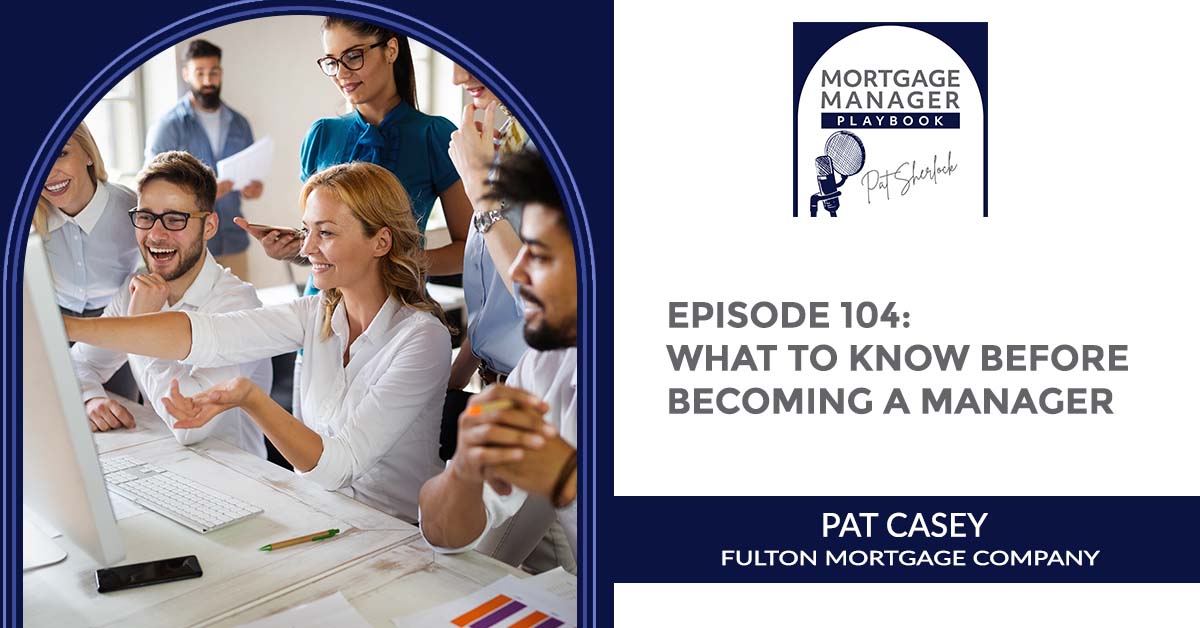
Pat interviews Pat Casey, EVP, Fulton Mortgage Company. Highlights include the importance of developing leadership skills; the value of mentoring; and hiring for cultural fit.
—
What To Know Before Becoming A Manager With Pat Casey
Our topic is such an important one. It’s the things to know before becoming a manager. I’m super excited to have our expert, Pat Casey. I’ve known Pat for many years. Pat is an excellent manager. He has been a veteran of mortgage banking. He’s Head of Sales and Marketing for Fulton Mortgage Company. Let’s get over your career as a Manager. How did you get started in managing? What would you say was your jumping point?
It is probably like every other loan officer who’s an originator out there. They made me the Manager because I was the worst producer in the branch. It didn’t hurt production as much. That’s what happened. The manager left and left three loan officers hanging. We tried to find a manager to replace them and couldn’t do it.
The company, after a month, got desperate and made me the Manager. My only caveat was that I was only eight months in the business at the time. I came from the real estate business. I was a sharp negotiator and said, “I’ will do it as long as I can keep doing my own production.” The production pay for the manager was significantly less than the regular loan officers.
It’s a story that many people have. It sounds like yours was the same. When you think about it when you first started and after all these years of managing, what was the best advice that you ever heard on the managing topic?
It’s more things that I’ve learned over time and seeking out people like you. To be quite frank, you have been one of my personal mentors in the business. Your sage advice over the years has helped me grow as a Manager. As soon as I got into that role, I came from being an entrepreneur in the real estate business. I sold a company and got into the mortgage business but I wasn’t prepared. The challenges of management and people skills many of the top producers see that because they can’t understand why people aren’t operating at their level.
Everybody has different goals, aspirations, strengths, and weaknesses. You start to learn that over time. If you can do that in advance, and there are ways to do that, what I would do to prepare before becoming a sales manager is to be a better listener. I can give you my ten bullets.
Before becoming a sales manager, be a better listener first. Click To TweetIt would be helpful for people that haven’t managed. In your experience, which is similar to many people in mortgage banking, you are typically a producer and then now made a Manager. When you look back over the years, and you mentioned a couple of them, which are listening and being intentional, what are some other things that you would want to share with our listeners?
It’s what you can do before and what you can do to prepare to be a manager. If you are thinking about doing that and you want to grow your mortgage ranking career in that direction, and there are people out there, prepare for it. You can do things in advance. These are some of the things. One of the things that I did was I took a top revenue producer for us. Somebody did over $100 million in 2019. To be quite frank, Brian Morley was very successful. Made him a Regional Manager. On paper, I looked and said, “That’s the stupidest thing in the world.”
What he did initially before he moved into the role is that he test-drove the role. He mentored two brand-new rookies for a year and learned what it took to bring them along and develop. They learned his management and leadership skills at a very high production level. He also went through the Future Leaders Program at MBA. We put him through the Future Leaders program, which you are with peers from all over the country. It is a fantastic program. You got to have a tremendous commitment to do that. From a time standpoint, we are a little fortunate that we are outside of DC, so to go to the Gettysburg Leadership Institute, which he did, was not a lot of travel. If you are on the West Coast, that might be a little tougher.
I will bounce around on my ten things. We seek out ways to learn and build on your leadership skills. Everybody says that, “Great salesmen are born, and great managers are born.” That is not the case. You need to learn. I remember reading one of your books. A long time ago, you interviewed the top 100 originators in one country. The number 1 producers at 100 companies, one of the common themes between all of them is they were in music, which is very competitive. It was to be the first tuba or something like that. It’s pretty interesting to reach the top of your game and develop that.
Seek out other opportunities. They may not come with your current manager to help you develop that. They may even be bad examples of what I wouldn’t do. I did seek out Dale Carnegie. I took their sales course but also their management course. Get involved with your local trade associations, the MBA, local MBA, the realtor builder associations, and community organizations. People are involved in Rotary and things. It will not only help you build your business and relationships but it will help you develop opportunities for leadership, particularly in things you are passionate about. That’s something you can do, along with being on top of your game.

Managerial Position: Getting involved with local trade associations will help build your business and relationship. It will also develop opportunities for leadership and the things you’re passionate about.
The other thing is that you need to develop what I call your own personal BOD or Board of Directors. I mentioned to you that I have been very fortunate, over time, to get to know people like Todd Duncan, Barry Habib, and Dave Savage but I sought them out. I flew across the country to meet with Dave Savage. I sought him back when he was originating in Newport Beach to learn better practices and things like that.
Other leaders, to compare notes of how they would build your business and who were successful, I sought them out and took them for coffee and lunch. You would get opposite things from people like Mike Twigg versus Gene Lugat on hiring experienced people or hiring rookies and learning how they built their businesses.
Seek out your own personal board of directors to help you learn beyond your current management team. There is a great way to do that and make yourself valuable to an organization before you get into the leadership thing. The test drive is the best thing to do. Take on an LO assistant to train or a rookie that you have to train from ground zero. It might start with an assistant to help you build your current practice but then learn what it takes to do what I call the four things. That is, recruit, train, motivate, and retain. You then got to produce at the same time.
When you look at it in the big picture, these were things that you did on your own initiative. This wasn’t something that the company, in other words, sponsored. You knew that you wanted to be in management and be a better manager. These were things that you initiated yourself. I would say that’s pretty common within the industry. Is that right?
Yes. I want to give credit to the people there. The initial entree was by default. I was very worried about even accepting that role for only eight months on the origination side. It was self-survival. It was either that or I was going back into the real estate business. I had to take control of my own destiny or at least control the outcome and learn some hard knocks.
My management perspective is producing managers. That’s what I managed most of my career, other than the area managers that didn’t produce. I also managed operations until the meltdown occurred, and then we had to bifurcate all that to meet the regulatory situation. I had multiple hats running the production and sales team but also balancing operations. That skillset is helpful in building those partnerships in this world. There were different dynamics for each of them.

Managerial Position: Skill set helps build thriving partnerships in today’s world.
When you look at it, it’s the common track where a producer becomes a manager. Certainly, in the analytics that my company has performed, what you see is that because you are a producer does not make you a good manager for the simple reason that it has different skillsets. The reality of it is that managing true top performers can be a very frustrating job.
Therefore, it’s an indication that’s probably something they are not suited for. The reality of it is to take it because you get an override is a bad strategy. One of the studies that we did, and I’m sure you’ve seen this yourself, is that top producers don’t understand why somebody isn’t like them. What that causes is certainly this issue of frustration. Do you have any comments on that?
Bullet number four is what I will call impose your system. Impose sounds a little negative but at the end of the day, it took me nine years to figure this out as a Branch Manager. I created the setup committee where I was a pretty good fireman at the end and troubleshooting deals but I finally, one day, said, “This is crazy. We need to manage it upfront.”
We got the whole team together. I had operations reporting to me along with sales. We got a group together and developed a process to bring loans in a quality way. I imposed the very successful origination system that I developed from my own personal workflow on the branch but I included them, so they owned it. They collaborated. To be honest with you, they got so good at updating changes because the industry changes. My advice to managers when I gave it to Brian was, “You got a successful system.”
The best part about it is that you bring people into the loop on it. You impose your system, “This is what works. We are all going to adjust it but I want your input. I value your input.” They enhance it. They will make it better. They will make you better. I found I’d review files for structure and strategy, and after a while, it’s like the audit with the IRS. They realized you weren’t looking at all the transactions, and then they started requesting the review because they got value out of it. I would learn changes where they would do something, and I would say, “What did you do here?” “If you take it at 80%, the LLPA is less.” “I would learn more myself.”
With the team, we have standup meetings every morning for 50 minutes where a processor would read a section of the Fannie Mae and talk about it. It would blow people’s minds how expert they were in that area because they boned up on it. It was a team effort. Impose your system on the branch. Get their buy-in and have their input.
If you’ve got a successful origination system, that’s one of the values the producing manager brings to the table. They bring a lot of baggage to the table and maybe some drawbacks but those are one of the values that they can bring. It can maybe help offset some other things until they do what we are talking about. They get the skillset they learn as long as they are invested in getting better in leadership. I will use Brian Morley as an example. He has invested personally in a coach on his own. The good managers that want to get there will invest in themselves.

Managerial Position: If you have a successful origination system, that’s one of the values the producing manager brings to the table.
I was also fortunate that at Crestar and then SunTrust, Mark Smith was President of the MBA. He was CMB and was very supportive of helping fund going to school, mortgage banking, the CMB process, and things like that. We had, at the time, more CMBs at our company than anywhere in the country. That’s back to the culture we have at Fulton in coaching for feedback, our Fulton experience, and changing lives for the better. Our leadership goes all the way through. Particularly, Jeff Scheuren, our CEO and President of the mortgage company, lives it. That’s helpful. He is supportive of future leaders. You have a company that’s supportive of that but if not, you invest in it yourself and get that information.
I went to school on a mortgage banking course after sixteen years in the business pad. I read all the trade journals. I thought I was on top of my game. I got out of that class and heard fifteen people from all around the country and from all different disciplines and realized I had scratched the surface of the business that warehouse lending itself was a business under itself. It was an epiphany for me and one of the best things I ever did. The only reason I did it is that it was offered in College Park, Maryland, which was about 30 minutes from my house. I was able to keep working and go to class at the same time, if that makes any sense.
There is this issue that every top producer is not suited to be a manager. Within mortgage banking, I don’t know that managing is valued as much as producing. Therefore, we encourage people to move to that. I also think it can be an epiphany if you recognize that it’s not for you. That’s what it does come down to. When the system is set up where, in other words, that’s the next position for them if they are a producer to hire other people and manage them, they are left on their own, which encourages this issue of anyone can manage. That’s not true. Any thoughts on that?
In other words, besides doing research on originators, we also did research on managers. I cannot tell you how many managers who were producing managers would talk about how frustrated they were and ultimately didn’t get an emotional reward for managing other people. They found it frustrating. The first step is to recognize what you are good at and what you want to do. The next step seems to be, “Now, I’m going to manage people.” It’s not that easy to be a manager because you meet all kinds of people.
I keep coming back to these maybe circular comments but test drive it to the talk-you-out-of-it speech. I talked about killing your bad hires early, which we don’t do. Approaching avoidance, I’ve made that mistake many times. The part where you’ve developed a lot of assessments and things like that is helpful. It’s certainly making a good hire. It comes down to you got to hire for attrition.
The recruiting piece is that you’ve got to be doing that as a contact sport for 365 days. You get a better broad choice of talent. Some people tend to do it and recruit where they take whatever bus comes along, and they get on it. That’s not a good way in the industry. It’s a hiring attitude and aptitude. One of my manager’s advice is 3 different times in 3 different places and, to be quite frank, three different people for cultural fit where they meet other people on your team. If that extends the hiring process, what’s their business plan? The big thing is, are they a cultural fit? That’s part of the vetting and hiring process.
People are going to be like-minded philosophies. They are going to adopt your systems and say, “Here’s our process,” and if it’s a fit, then you bring them on. Those are people that can enhance your team. I have been doing it for many years and still don’t have the answers. You wish you could cut their chest open, look inside, and see what’s there.
I was reading an article I told you that we talked about. It was from Warren Buffett. He looks to hire for intelligence and energy. A real key that trumps all these is integrity. You try to find that out. Some of those questions are like, “You tell me about a situation where you saw somebody do something unethical or fraudulent. How did you handle the situation?” Give them some opportunity to see how they do that.
Certainly, then do the reference checks. Check common links on LinkedIn. Check quiet industry references if there’s somebody that’s an existing originator. The rookies are always a challenge because even if you have the best selections, they could get in and be very successful but not like the business because they don’t have a personal lifestyle matchup with work-life balance on it. There is also the exit. Even though they were successful, they didn’t build a mortgage banking practice, if you will.
My last question before we wrap it up is, in your opinion, what is the secret sauce to being a good manager and what do people miss?
I will be reiterating that thing about being a better listener. Be very religious about scheduling one-on-ones with your people. In their top five, make sure you are listening to them on a busy day. It’s continuing to seek opportunities to build your skills to be better. They see you doing that. The other thing I said is about reaching the top of your game that we talked about.
The old Wayne Gretzky quote, “Skate to where the puck is going to be versus where it is now,” helps you get innovative. You can lead people to where it is to help them grow their mortgage banking practice. There is also the culture. You create a culture of inclusion, transparency, and collaboration. You got to live it. You got to walk the walk and talk the talk. You got to live it in how you run your personal business as a producing manager but also how you interact with your operations team and everybody else.
Create a culture of inclusion, transparency, and collaboration. You need to walk the talk. Click To TweetI heard a quote that, “Culture eats strategy for breakfast every day.” We do that at Fulton Mortgage Company. That’s why we are able to attract people that want to build a long-term mortgage banking practice. They are not just in it for the money or my basis points. They want to get paid. They want a reward for their effort. That can’t diminish that. It’s all about lifelong relationships with your referral sources and customers. You make friends with other people you do business with, and you do business with friends. It’s fun.
When I hear a loss or say that they hate realtors, my immediate gut reaction is that I don’t usually challenge them in an interview but it’s like, “That’s terrible. If you wake up feeling that way every day, maybe you should think about getting out of the mortgage banking business in general.” You’ve got to have a different view of that. We are in the real estate business. We are providing the lubricants.
It is all those things we’ve talked about. You got to be better. You want to be a leader. I do get a kick out of helping. As a producer, I love helping get people into homes. It felt like with certain transactions. You were able to make it happen because of your knowledge and your skillset. You got them in a home that maybe they wouldn’t have gotten in. It’s the same thing I have gotten out of over the years. I still derive the thrill of helping somebody grow their mortgage banking practice, their career, and their life, even if it’s just a simple five-minute advice.
You have to become a lifelong learner. Learn how to get better and accept your mistakes every day. Click To TweetTo be quite frank, the big value I get is in developing people that are willing to challenge me personally and even say, “You were out of line on that. That’s not good.” I might take it pretty hard for 30 seconds but I would be like, “You are right. That was not the right approach. I need to get better on this now.” I don’t know everything. That’s arrogance, and that will take you down. You’ve got to constantly be a lifelong learner. Ask, “How do I get better?” I’m making mistakes every day. I probably made a couple on this interview. I’m trying to get at least a couple of mistakes in everything I do. I learn from them.
You shared a lot of great information that is practical, which is the whole point of this show. I want to thank you for sharing it. Certainly, your wisdom is right on target. Thanks, Pat, and I want to thank everybody for tuning in.




